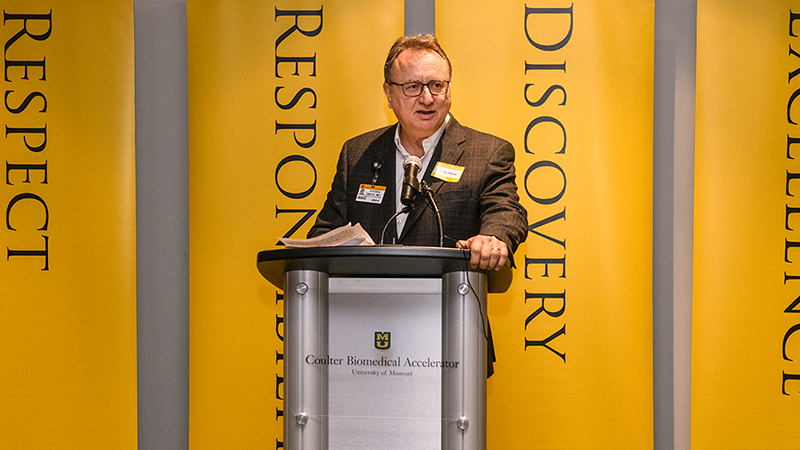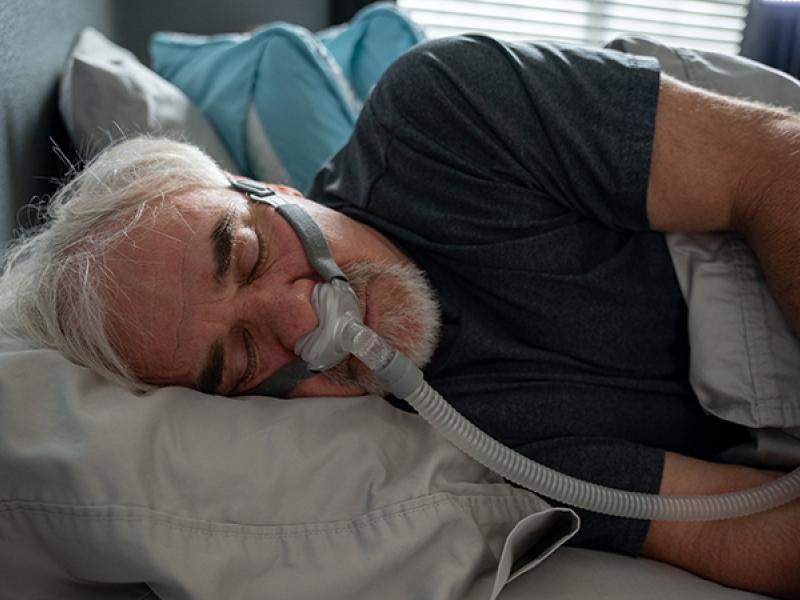
The University of Missouri’s Coulter Biomedical Accelerator Program awarded four grants totaling $260,000 to help promising medical discoveries make the transition from laboratory research to commercial investment and direct patient care. The grants were announced at an awards ceremony on Nov. 5 at the MU School of Medicine.
“The University of Missouri is home to leading experts in all fields of engineering, medicine and business,” said Mark McIntosh, PhD, MU vice chancellor for research and economic development. “The Coulter Biomedical Accelerator Program brings this expertise together with the goal of delivering practical solutions to pressing medical problems affecting our state, nation and the world. The Coulter Program is an excellent example of the power of interdisciplinary collaborations at MU.”
MU is one of only 15 academic institutions in the country and the only university in Missouri offering a Coulter Program. Bringing engineers and clinicians together to develop solutions to unmet medical needs is a key premise of the Coulter Program.
MU’s Coulter Program provides annual awards to researchers whose projects demonstrate great scientific potential and meet a well-defined health care need. The projects are reviewed by a committee that includes entrepreneurs, industry experts, accomplished researchers and venture capital investors.
The 2019 Coulter Program awards were given to four teams with a total of nine researchers to fund the following projects:
Smart Monitor for the NICU: Adaptive System for Detection and Prediction of Apnea, Desaturation and Bradycardia in Premature and Low-birth-weight Infants: The research team is developing software that will use signals in existing bedside monitoring equipment to reliably determine and predict adverse events common to NICU patients. The software will alert nurses to issues such as an insufficient amount of oxygen in the blood, and predict events so precautions can be taken to help babies avoid or quickly recover from adverse episodes.
- Roger Fales, PhD, Department of Mechanical and Aerospace Engineering
- John Pardalos, MD, Department of Child Health
Pressure-sensor-integrated Smart Bandage for Improving Adherence to Offloading Diabetic Foot Ulcers: Researchers are developing a smart bandage system that can continuously monitor pressure on diabetic foot ulcers and provide real-time feedback to patients and clinicians through a cloud-based application on their computers and smart devices. Smart bandages have the potential to accelerate healing rates and pinpoint higher-risk individuals who may need additional monitoring and care.
- Xueju “Sophie” Wang, PhD, Department of Mechanical and Aerospace Engineering
- Carolyn Crumley, DNP, RN, Sinclair School of Nursing
Golden Gullet: Sustainably Synthesized, Gold Nanoparticle-based, Ready-to-use, Palatable and Edible Contrast Agent for X-ray Swallow Studies: There is a critical need for a palatable, sustainable contrast agent to help improve the diagnosis of swallowing disorders. This research team is developing a “Golden Gullet” agent that contains gold nanoparticles encapsulated using food industry byproducts. This new contrast agent can be used to formulate a new product for use in X-ray swallow tests and ultimately standardize the diagnosis of dysphagia.
- Kiruba Krishnaswamy, PhD, Departments of Biomedical, Biological and Chemical Engineering; Food Science at the College of Agriculture, Food and Natural Resources
- Teresa Lever, PhD, Department of Otolaryngology - Head and Neck Surgery
Tiger Patch for Comfortable, Adhesive‐free, Long‐lasting and Accurate Cardiac Monitoring: On average, 25% of patients who use electrocardiogram monitoring devices for irregular heartbeats are unable to comply with usage due to skin irritation and itching from the device and end up with poor diagnostic data. To address this unmet clinical need, the team is developing Tiger Patch, a cardiac monitoring device that will provide a comfortable and accurate way of monitoring ECGs for arrhythmia diagnosis and management.
- Zheng Yan, PhD, Departments of Mechanical and Aerospace Engineering; Biomedical, Biological and Chemical Engineering
- Jian Lin, PhD, Department of Mechanical and Aerospace Engineering
- Sandeep Gautam, MD, Department of Medicine
The recipients were recognized in a ceremony led by Latha Ramchand, PhD, provost and executive vice chancellor for academic affairs; Steven Zweig, MD, dean of the MU School of Medicine; Elizabeth Loboa, PhD, dean of the MU College of Engineering and vice chancellor for strategic partnerships; and Jaya Ghosh, PhD, program director of the Coulter Biomedical Accelerator.
The MU Coulter Program began in 2012 as a five-year partnership with the Wallace H. Coulter Foundation. Although the partnership with the Coulter Foundation ended in 2017, leaders at MU decided to extend the program for five more years with university funding.
Since its inception, the Coulter program has helped MU research projects generate more than $18.7 million in new government grants and has led to the creation of 14 start-up companies. To date, these start-up companies have raised $7.3 million from early-stage investors. Three start-ups have each raised more than $500,000, and another two Coulter technologies have been successfully licensed to established companies, for a total of five “Coulter wins.”





